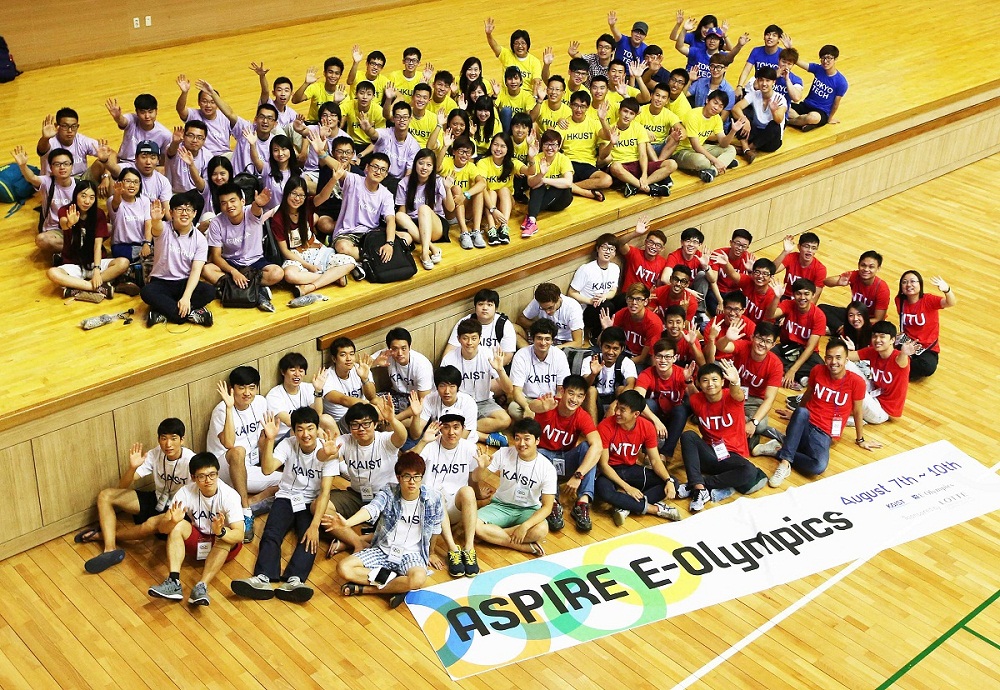event
About 150 undergraduate students from five leading science and technology (S&T) universities in Asia met at the KAIST campus to attend the E-Olympics on August 7-9, 2014.
The E-Olympics began as a student exchange conference held under the Asian Science and Technology Pioneering Institutes of Research and Education (ASPIRE) League, which offers a variety of events, such as workshops, sports matches, lab visits, special lectures, and art performances, to promote academic and research collaborations and cultural sharing between the students of the league member universities.
Founded in 2009, the ASPIRE League is a university consortium consisted of five top S&T universities in Asia: KAIST in Korea, the Hong Kong University of Science and Technology (HKUST) and Tsinghua University in China, Nanyang Technological University (NTU) in Singapore, and Tokyo Institute of Technology (Tokyo Tech) in Japan. The ASPIRE League aims to provide a knowledge and technology hub for innovation in Asia through the advancement of science and technology and the development of human resources.
Since its start, the ASPIRE League has been holding an annual conference with programs for research collaboration, student exchange, educational cooperation, and satellite laboratories among professors, senior managers, and students of the member universities. This year, however, the consortium decided to dedicate the conference to students by holding the E-Olympics.
Each university sent 30 students to KAIST for the participation of the E-Olympics. For three days, participating students engaged in discussions and presentations at academic workshops; held athletic games including a relay race, basketball, and a rowing race; and toured a few KAIST laboratories, among them: the E-mobility Research Center, the Bio-imaging and Cell Signaling Research Center, the Mechatronics Systems and Control Center, and the Center of Field Robotics for Innovation, Exploration and Defense.
The students also attended a music concert performed by a KAIST student club and a lecture entitled “Entrepreneurship through Global Networking” that emphasized the importance of personnel networking in transferring technological innovation into business opportunities.
Chang-Dong Yoo, the Dean of the International Office at KAIST, said, “The E-Olympics will offer students from top science and technology universities in Asia opportunities to interact with each other on a more personal level. I hope that through many of the E-Olympics programs, the students will learn about each other’s culture and academic strength and develop a sense of community to create a “New Asia” by working together.”

-
event Top University Leaders Urge Innovation for the Post-COVID Era at the KAIST Summit
- Presidents of KAIST, MIT, Tokyo Tech, and Northwestern to define new roles and responsibilities of universities for the post-COVID and 4IR eras during an online summit in celebration of KAIST’s 50th anniversary. - Universities are facing ever-mounting pressure to address impacts brought on by COVID-19 and the emerging technologies of the Fourth Industrial Revolution (4IR). Presidents from MIT, Tokyo Tech, and Northwestern University will join the KAIST Summit to explore new direction
2021-02-01 -
people Waking Up Is Hard to Do: Scientists have discovered a new mechanism in the core gears of the circadian clock.
The US News & World Report released an article (Feb. 18, 2011) on KAIST’s research collaboration with Northwestern University in the US to identify a gene that regulates the rhythm of a fruit fly’s circadian clock, which may be applied to explain human’s sleep-wake cycle. The research result was published February 17 in the journal Nature. For the link of the US News & World Report article, please go to the following link: http://www.usnews.com/science/articles/2011/0
2011-02-21 -
people Texas Instruments, Inc. Agreed for Collaborative Research with Professor Hai-Joon Yoo, the Electrical Engineering Department of KAIST
Professor Hai-Joon Yoo from the Electrical Engineering Department of KAIST made a research collaboration agreement with Texas Instruments (TI), Inc. in July 2010 to develop a “Many-core Processor Chip,” a chip that is designed to emulate a human brain. TI, Inc. is an American company based in Dallas, Texas and renowned for developing and commercializing semiconductor and computer technology. The company is the 4th largest manufacturer of semiconductors worldwide, 2nd supplier
2010-08-05 -
event World Research University Heads to Discuss Challenges in Global Financial Turmoil
About 70 leaders of the world"s major research universities will discuss how to better contribute to continued development of human society in global financial turmoil at a symposium organized by KAIST Monday (Sept. 21) at the Westin Chosun Hotel in Seoul. Participants of the 2nd International Presidential Forum on Global Research Universities are from 40 universities in 25 countries, including Stanford University and Georgia Institute of Technology of the United States, Berlin Institute o
2009-09-16 -
policy Dual Degree Programs with TU Berlin
Dual Degree Programs with TU Berlin- Five students to be exchanged each year from this year, receive degrees from both schools- Final stage of negotiation with GIT, UCSB- On-going DDP negotiations with Delft University of Technology in Netherlands, Royal Institute of Technology in Sweden, Technical University of Denmark, Norwegian University of Science and Technology, Tsinghua University in China, Tokyo Institute of Technology- DDPs with Ecole Polytechnique, INSA Lyon of France, and University o
2007-03-19